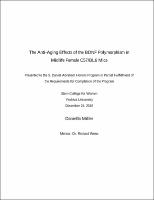Please use this identifier to cite or link to this item:
https://hdl.handle.net/20.500.12202/4495Full metadata record
| DC Field | Value | Language |
|---|---|---|
| dc.contributor.advisor | Weiss, Richard | en_US |
| dc.contributor.author | Miller, Daniella | |
| dc.date.accessioned | 2019-07-09T18:23:15Z | |
| dc.date.available | 2019-07-09T18:23:15Z | |
| dc.date.issued | 2018-12-24 | |
| dc.identifier.citation | Miller, Daniella. The Anti-Aging Effects of the BDNF Polymorphism in Midlife Female C57/BL6 Mice Presented to the S. Daniel Abraham Honors Program in Partial Fulfillment of the Requirements for Completion of the Program Stern College for Women Yeshiva University December 24, 2018. | en_US |
| dc.identifier.uri | https://hdl.handle.net/20.500.12202/4495 | |
| dc.identifier.uri | https://ezproxy.yu.edu/login?url=https://repository.yu.edu/handle/20.500.12202/4495 | |
| dc.description | The file is restricted for YU community use. | en_US |
| dc.description.abstract | Aging is associated with cognitive decline and increased allostatic load which increases the brain’s vulnerability to hormone-mediated structural remodeling. Both sex and stress hormones exert change on the brain, particularly in the hippocampus which is a structure that is essential in neurogenesis, plasticity and, consequently, resilience to stress. Since hormones are key factors in stress response and aging, it is important for studies to include both sex and age as variables since the female lifecycle is characterized by hormonal fluctuation. The BDNF polymorphism is associated with increased stress susceptibility as well as depression, which has been shown to lead to accelerated/premature aging and increased cognitive decline. The mechanism and manifestation of depression have been shown to be sex-specific which has been similarly shown in age-related diseases. Despite this, there is a lack of research examining the relationship between age, sex, and cognition. Since depression is part and parcel with aging and cognitive decline, which are all associated with the BDNF polymorphism, this study provides an examination of the effects of the BDNF polymorphism on sex in midlife animals. The results reveal cognitive deficits in the males with the polymorphism as shown in the Y-maze spontaneous alternation test for spatial working memory as well as in the dendritic plasticity of basal dendrites in the pyramidal neurons of the dorsal CA1 region in the hippocampus. The data for the females with the polymorphism, however, revealed a sex-specific cognitive enhancement as seen in the delayed Y-maze test for spatial recognition memory, as well as comparable cognition and structural plasticity to their wildtype counterparts in all other experiments. These results reveal a sex-specific effect of the BDNF polymorphism in midlife females and confirm the importance of further research examining sex and age in the brain. | en_US |
| dc.description.sponsorship | S. Daniel Abraham Honors Program for Stern College for Women | en_US |
| dc.language.iso | en_US | en_US |
| dc.publisher | Stern College for Women. Yeshiva University. | en_US |
| dc.rights | Attribution-NonCommercial-NoDerivs 3.0 United States | * |
| dc.rights.uri | http://creativecommons.org/licenses/by-nc-nd/3.0/us/ | * |
| dc.subject | anti-aging | en_US |
| dc.subject | BDNF Polymorphism | en_US |
| dc.subject | senior honors thesis | en_US |
| dc.subject | Midlife female C57/BL6 Mice | en_US |
| dc.title | The Anti-Aging Effects of the BDNF Polymorphism in Midlife Female C57/BL6 Mice. | en_US |
| dc.type | Thesis | en_US |
| Appears in Collections: | S. Daniel Abraham Honors Student Theses | |
Files in This Item:
| File | Description | Size | Format | |
|---|---|---|---|---|
| Daniella Miller Honors Thesis Project.pdf Restricted Access | HR/SCW | 882.96 kB | Adobe PDF |  View/Open |
This item is licensed under a Creative Commons License

